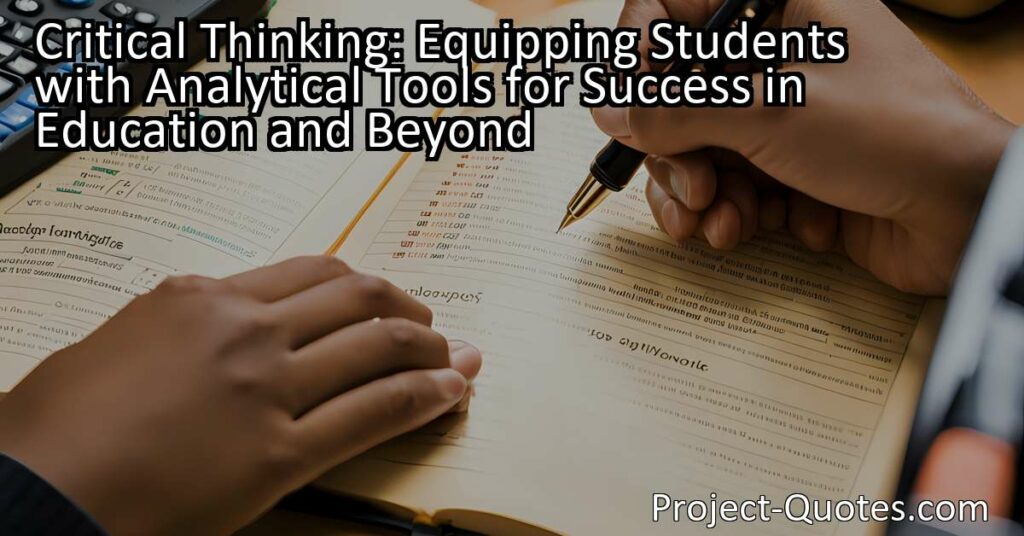The goal is to provide analytical tools that will last students a lifetime.
Edward Tufte
Critical Thinking: Equipping Students with Analytical Tools for Success in Education and BeyondCritical thinking involves questioning assumptions and evaluating evidence, equipping students with the skills to navigate through information, identify credible sources, and think independently. By prioritizing the development of critical thinking skills, educators can empower students to make informed decisions and succeed in both academic and personal aspects of their lives.
Table of Contents
Meaning of Quote – The goal is to provide analytical tools that will last students a lifetime.
In education, we often focus on providing students with the necessary skills and knowledge to succeed academically. However, it is equally crucial to equip them with analytical tools that will last them a lifetime. Edward Tufte, a renowned expert in data visualization and information design, emphasizes the significance of these analytical tools in the quote, “The goal is to provide analytical tools that will last students a lifetime.”
When we talk about analytical tools, what exactly do we mean? In its simplest form, analytical tools refer to the strategies and techniques that help individuals dissect, understand, and interpret information effectively. These tools enable students to critically analyze various types of data, whether it be textual, numerical, or visual, empowering them to make informed decisions and form well-rounded opinions.
One of the fundamental analytical tools that students should possess is the ability to think critically. Critical thinking involves questioning assumptions, evaluating evidence, and considering multiple perspectives. By instilling this skill in students, we enable them to navigate through the vast sea of information available to them, identifying credible sources and challenging biased opinions. Critical thinking allows students to approach problems with an open mind, uncover hidden connections, and arrive at logical conclusions.
Another vital analytical tool that students need is the ability to effectively gather and evaluate information. In today’s digital age, where information is readily accessible at our fingertips, it is crucial to teach students how to discern reliable sources from inaccurate or misleading ones. Students should be equipped with the necessary skills to conduct research, evaluate the credibility of sources, and differentiate between facts and opinions. By honing these skills, we empower students to become discerning consumers of information, ensuring they make sound judgments based on the evidence presented.
Moreover, data literacy is an analytical tool that plays a significant role in the lives of students. In a world inundated with data, it is essential for students to understand how to interpret and analyze it effectively. Data literacy encompasses not only the ability to read graphs, charts, and tables but also the skill to draw meaningful insights from the data presented. By exposing students to data literacy at an early age, they will be better equipped to make evidence-based decisions, interpret statistics, and critically evaluate claims made through data.
Furthermore, visual literacy is an essential skill that students must possess. In an increasingly visual world, being able to understand and create visual representations is crucial. Edward Tufte himself is renowned for his work in data visualization, emphasizing the importance of clear and informative visual displays. Visual literacy allows students to interpret and create visual representations such as graphs, charts, and infographics. By developing this skill, students can effectively communicate information visually, enhancing comprehension and facilitating the sharing of complex ideas.
Another significant analytical tool that students should develop is the ability to effectively communicate their ideas and arguments. No matter how insightful their thoughts may be, if students cannot express themselves clearly, their ideas may not have the impact they desire. Therefore, it is vital to teach students effective communication skills, including oral and written expression. By honing these skills, students can articulate their ideas persuasively, engage in meaningful discussions, and contribute to a broader conversation.
In addition to these specific analytical tools, there are also broader skills that students should cultivate to last them a lifetime. These include problem-solving, creative thinking, and adaptability. Encouraging students to approach challenges with a problem-solving mindset enables them to tackle complex problems and develop innovative solutions. Similarly, fostering creative thinking empowers students to think outside the box, explore unconventional approaches, and propose new ideas. Finally, teaching students to be adaptable prepares them for the ever-changing world, equipping them with the resilience necessary to navigate unexpected challenges and embrace new opportunities.
As educators, it is our responsibility to provide students with the necessary tools and skills to navigate the complexities of life beyond the confines of the classroom. While academic content is undoubtedly important, equipping students with analytical tools ensures that they are well-prepared to face the challenges of the future. By emphasizing critical thinking, information evaluation, data and visual literacy, communication skills, problem-solving, creative thinking, and adaptability, we can lay a strong foundation for their future success.
In conclusion, Edward Tufte’s quote, “The goal is to provide analytical tools that will last students a lifetime,” encapsulates the significance of equipping students with the necessary skills to critically analyze information effectively. Analytical tools such as critical thinking, information evaluation, data literacy, visual literacy, communication skills, problem-solving, creative thinking, and adaptability empower students to make informed decisions, think independently, and navigate the complexities of the world. By prioritizing the development of these tools, educators can ensure that students are well-prepared for success in both their academic and personal lives.
I hope this quote inspired image brings you hope and peace. Share it with someone who needs it today!


